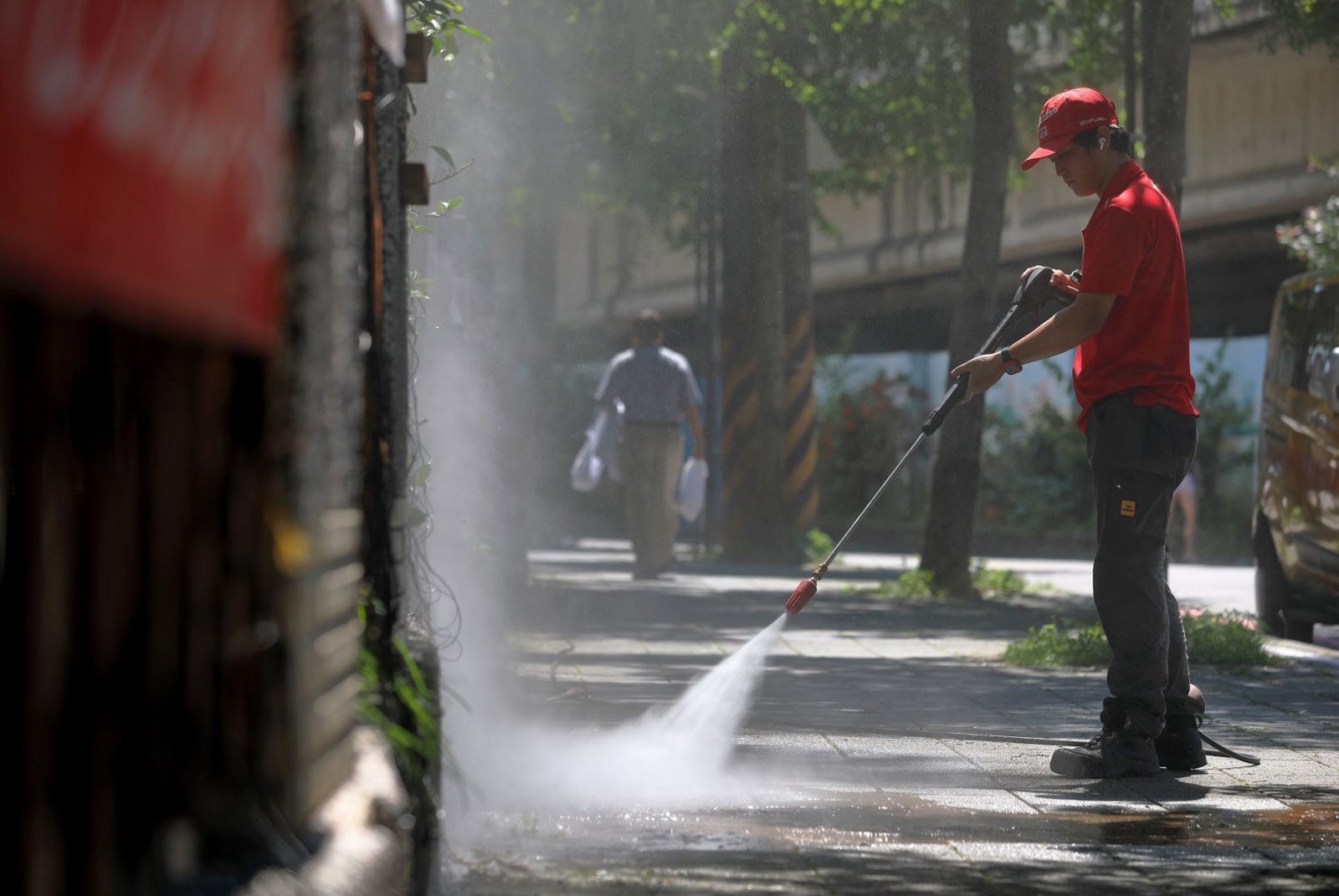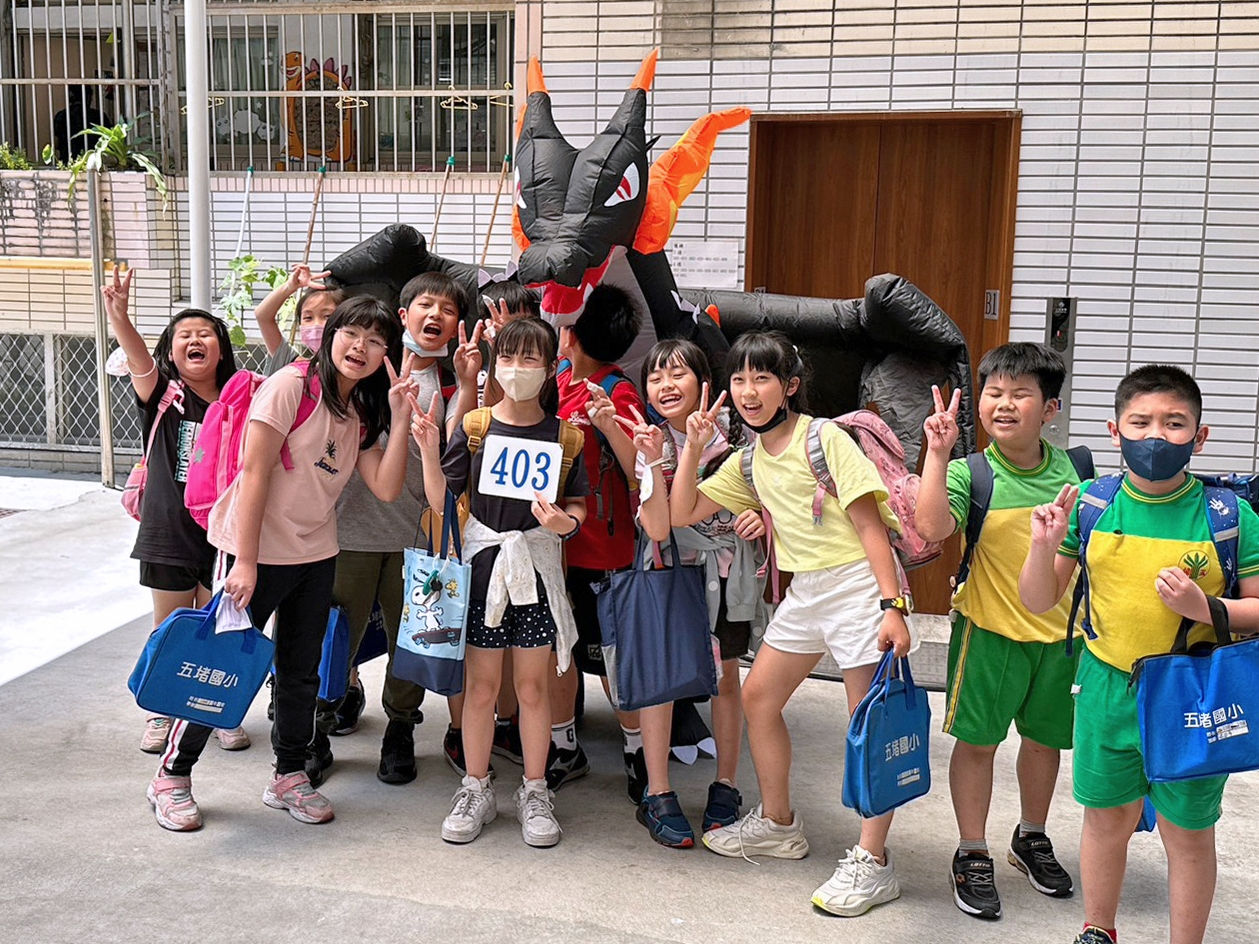Friendly Washing Society cleans schools helps homeless regain esteem

Source:Chien-Tong Wang
Author Lin Li-ching led a group of homeless people from Taipei on a community cleanup effort. Using military-grade water canons, they not only washed away the dirt and grime from the streets and campuses, but also washed away stigmas, earning a steady income along the way.
Views
Friendly Washing Society cleans schools helps homeless regain esteem
By Ching Fang WuFrom CommonWealth Magazine (vol. 775 )
Today is Floor Cleaning Day at Keelung’s Wudu Elementary School. Six figures dressed in red uniforms are busily moving in and out. They locate water sources, ready the hardware, activate the water guns, and the thick moss and dirt are quickly washed away, leaving the floor tiles shining brightly.
It is hard to imagine that these people were once homeless individuals. Currently they are all employed by the Friendly Washing Society, founded by author Lin Li-ching.
 In the past, homeless people may be easy to make people afraid to approach, but as soon as they put on the children's playful fire-breathing dragon costume, children are happy to approach and take pictures. (Source: Lin Li-ching)
In the past, homeless people may be easy to make people afraid to approach, but as soon as they put on the children's playful fire-breathing dragon costume, children are happy to approach and take pictures. (Source: Lin Li-ching)
Lin Li-ching trains homeless people in Wanhua, equipping them with job skills such as floor cleaning and emptying abandoned houses. He also organized the You Shi Care Association, raising around NT$500,000 in small monthly donations. This time the Friendly Washing Society is being mobilized for the sake of public welfare.
A best-selling book and a pandemic that brought heroes into view
In 2017, Lin Li-ching, who was working as a construction site foreman, published The Workers, which depicts the diverse lives of construction workers. He became a best-selling author, and his story has been adapted into a movie and TV series. His job at the construction site changed from full-time to part-time, then to supervising young apprentices on projects, and finally, as each of his buddies graduated and started their own businesses, he found himself with nothing to do.
The fame of being a best-selling author led to a constant stream of invitations to give speeches. If he wanted to, he could always find work supervising at construction sites. However, "I had no new goals in life," he admits. That is, until Wanhua was hit hard by the COVID-19 pandemic.
Many of the blue-collar workers in the Greater Taipei area that Lin focuses on are active in the Wanhua area. He started documenting Wanhua on Facebook, writing about Fang He Sheng, the local neighborhood representative, who was collecting supplies for the disadvantaged, and Zhang Xianzhong, the chairman of Mangcaoxin Charity Association, who was delivering meals to the homeless. He also wrote about how Wanhua businesses were connecting with each other to set up community supply stations and occasionally criticized the government.
Despite bringing attention and support to Wanhua, Lin felt that as a writer he was more talk than action.
"Criticizing the government is futile. Only by taking action can we change the community," he thought. He realized that it was also challenging for local NGOs focused on homelessness to provide vocational training. With his background as an engineer, he had the technical expertise “to teach them how to do jobs.”
He connected with local NGOs such as the Homeless Taiwan Association and Do You a Flavor in the attempt to introduce young homeless individuals willing to work in ironworking and woodworking. However, he ultimately found that it did not work.
Homeless individuals that have experienced significant difficulties tend to magnify their setbacks and adopt a negative outlook, making it difficult for them to adapt to the traditional apprenticeship system in blue-collar trades.
But when Lin offered some homeless people a high-pressure cleaning machine to try out, their expressions changed completely. When they turned on the water gun, the feedback of the transformation from dark to light was incredibly powerful.
"It felt to them like they’d gotten a big toy," Lin described. Homeless individuals have less physical stamina and patience compared to regular workers, so for them to work efficiently, they need the best tools. "With good experiences, their self-confidence can be built up faster."
Sometimes you need more than just the right tools for the job. Most high-pressure cleaning machines take a lot of physical strength to operate, but many homeless individuals were unable to handle them. So Lin directly commissioned a manufacturer to customize an electric starter system that makes it easier to start the machine. He also purchased industrial-grade nozzles. While others use them to clean warship lines or remove rust and paint from cars at automotive factories, he uses them to wash buildings and floors, washing away not only dirt but also the deep-seated stigmas associated with homelessness.
One day, a teacher in Keelung asked if they could help clean the school floors because a student had slipped and broken a bone. Keelung has a lot of rain, which leads to the growth of persistent moss, so the floors need to be cleaned every six months. Over the course of a year, with positive word-of-mouth from the teachers, the Friendly Washing Society became a frequent visitor to Keelung schools, with some schools even becoming repeat customers.
(Source: Chien-Tong Wang)
"I had to find sponsors before I could take action," Lin reflects. Homeless people have about 70 percent of the work capacity of regular workers. So in order for them to secure jobs and get paid regular wages, the cost of equipment and tools would have to be kept low. "Otherwise, competing directly in the market would surely result in losses."
The Friendly Washing Society has a core team of about five former homeless individuals, each of whom can earn around NT$2,000 to 2,500 (ca. US$80) for cleaning floors. And with additional work such as clearing out abandoned houses, they can earn up to NT$30,000 (ca. US$1,000) per month.
With a steady salary, “many of their practical needs are naturally met," remarks Lin. He notes that some use their money to buy medicine when they are sick, others buy motorcycles or iPhones, some rent apartments, and some even find girlfriends.
In Wanhua, NGOs for the homeless have sprung up everywhere, exchanging resources and developing their own vocational training programs. For instance, Do You a Flavor’s House of Daily Tasks is committed to introducing homeless people to clean the homes of disadvantaged individuals, while the Homeless Taiwan Association’s Heart and Hand Village Empowerment Center hopes to train them in electrical and plumbing skills.
"When professionals come in, it opens up possibilities for innovative employment," offers Wu Yen-teh, co-founder of Do You a Flavor. In the past, homeless people could only find work in lower level areas of society and had a hard time entering such energetic, vibrant places as schools. Notably, this work provides positive value, helping children avoid accidents, and bringing psychological fulfillment to the homeless as they feel needed by the society.
 One of the foremen who specializes in cleaning up lonely death scenes, and leads the team in handling abandoned house cases. (Photo by Pei-Ying Hsieh)
One of the foremen who specializes in cleaning up lonely death scenes, and leads the team in handling abandoned house cases. (Photo by Pei-Ying Hsieh)
The Friendly Washing Society also created a workplace support system.
Young people make up about 10 percent of the homeless population, and it is easy for outsiders to assume that these people are gluttonous and lazy. However, that is far from the truth.
Chu Kang-yung observes that in recent years there has been a notable increase in the number of young individuals facing difficult circumstances. A common thread among them is the vulnerability of their family support systems. With their livelihoods disrupted by the pandemic and lacking recognition within the social welfare system's safety net, they have become marginalized and neglected by society.
Providing shelter, covering debtors, and extending support
In Lin’s view, the courts and the Administrative Enforcement Agency are the main reasons people become homeless. Among the Friendly Washing Society’s associates, two were sentenced because their identity had been stolen and used to open accounts for scammers. Once a homeless person has been employed for a year, the Administrative Enforcement Agency would cock one-third of their wages to compensate victims, pay state fines, and National Health Insurance premiums in arrears.
Upon receiving such notices, the employees are typically fired on the spot, and accumulating debts force these individuals to continually flee from stable work environments, leading to eventual collapse.
"It's not that they lack the willingness to strive for better lives, but their efforts seem futile due to the overwhelming debts and mounting pressures. So taking that step becomes an insurmountable challenge," explains Lin.
Lin aims to redefine work as a source of hope rather than despair. He assists employees in repaying their debts through installment plans, and acts as a guarantor for them to purchase motorcycles. He also provides guidance with financial planning, ensuring that NT$500 of each Friendly Washing Society associate’s NT$2,000 daily wages gets put into a savings account.
Street people often struggle to afford the high housing costs in Taipei, and few landlords are willing to rent to formerly homeless people. To address this issue, the Friendly Washing Society leases accommodations under the company's name to sublet to employees.
The workplace also serves as a source of peer support. "Homeless people are fundamentally a marginalized group in terms of social connections, giving them a deep yearning for a sense of belonging," observes Wu Yen-teh.
Lin Li-ching (Source: Chien-Tong Wang)
Wearing the company uniform, homeless people experience a sense of acceptance and inclusion.
Earning respect through perseverance
Wanhua residents’ perceptions of street people have undergone a transformation, particularly regarding those that are gainfully employed. Overcoming prevailing stigmas has proven challenging, but not insurmountable.
On this day, Lin Li-ching is tirelessly busy. He recently borrowed a former military housing unit from Fang Ho-sheng near the Nanjichang Night Market as a secondary base. After some refurbishments, the space will serve as a car wash training facility, as well as a place for offering instruction in painting, plumbing, and electrical work.
Despite over a year at the head of the company, Lin has not yet paid himself a salary. He acknowledges that although the Friendly Washing Society has gained considerable online attention, the venture is still operating at a loss. And by the time the new base is ready, two million NTD in donated funds will likely have been depleted.
There is a lot to invest in his employees. However, Lin's unwavering determination is evident as he marvels at those who express an interest in learning woodworking and insist on purchasing a saw table. “That’s what change is all about. And that’s the way to a promising future.”
"In our society, it's always people with stable incomes who demand that people must live with dignity," Lin Li-ching provocatively questions in his book The Workers. "But shouldn't someone who aspires to lead a humble and hardworking existence also be worthy of respect?"
Through his actions, Lin tries to offer a solution.
Have you read?
Translated by David Toman
Uploaded by Ian Huang






